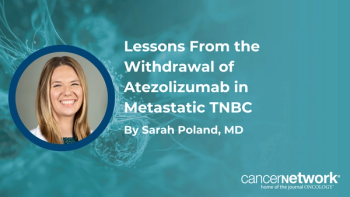
Oncology NEWS International
- Oncology NEWS International Vol 17 No 4
- Volume 17
- Issue 4
One-third of metastatic breast ca patients develop brain mets
About one-third of metastatic breast cancer patients with HER2 overexpression develop metastases to the brain, compared with 5% to 20% of the general metastatic breast cancer population, according to findings from a large observational study in newly diagnosed HER2-positive breast cancer.
SAN ANTONIO-About one-third of metastatic breast cancer patients with HER2 overexpression develop metastases to the brain, compared with 5% to 20% of the general metastatic breast cancer population, according to findings from a large observational study in newly diagnosed HER2-positive breast cancer.
Denise A. Yardley, MD, program director of breast cancer reserach at the Sarah Cannon Research Institute, Nashville, reported findings from the registHER study at the 2007 San Antonio Breast Cancer Symposium (abstract 6049).
RegistHER study
RegistHER is a multicenter prospective observational study of 1,023 patients, newly diagnosed with HER2-positive metastatic breast cancer, enrolled at 240 US sites from 2003 to 2006, who received treatment designed by their oncologists. The current analysis was restricted to the 768 patients diagnosed by July 1, 2005, thus allowing a median follow-up of 18 months from the occurrence of metastases at the time of data cut-off.
“Metastases in HER2-positive disease has been a big issue,” Dr. Yardley said. “This prospective study offers a unique opportunity to study the natural history of HER2-positive metastatic breast cancer and to examine treatment patterns and outcomes in a real-world setting.”
The fact that patients with HER2-positive metastatic breast cancer are more likely to develop central nervous system (CNS) metastases than those with HER2-negative disease has not been explained.
“The CNS has been a sanctuary site,” she said. “While trastuzumab [Herceptin] provides excellent systemic control, it does not cross the blood-brain barrier.”
A surprise
There is a theory, Dr. Yardley said, that CNS disease develops more often in HER2-positive patients because these patients obtain excellent disease control from trastuzumab [Herceptin] and thus live long enough for CNS disease to develop.
“But we did not find this,” she said. “In the registry, we found that CNS events occur very early, actually, mostly within the first year of the development of metastases. This was a bit of a surprise, and contrary to what we had thought.”
The analysis found that 236 patients (30.7%) developed CNS metastases over the 18 months of follow-up. This included 52 (6.8%) who had clinically apparent CNS metastases at the time of their initial metastatic breast cancer diagnosis, and 184 (23.9%) who developed CNS metastases as a later site of disease progression.
Patients who developed CNS metastases were younger (P = .0347), more likely to be hormone-receptor negative
(P = .0044), and had a higher disease burden (based on number of metastatic sites at diagnosis) (P = .0356), compared to patients without CNS metastases, Dr. Yardley reported.
Patients without clinically apparent CNS disease at presentation and who developed it during treatment for metastatic disease had a median time to the first CNS event of 12.1 months. Among the subset who had CNS metastases as their first and only site of progression after metastatic diagnosis, time to the first event was 11.3 months.
Median survival following the diagnosis of CNS metastases was 13.9 months. But for patients who had a CNS metastasis at the time of diagnosis, median survival was 36.1 months, Dr. Yardley reported.
Median survival time is considerably higher than would be expected, she added, based on the observation that survival of patients with brain metastases in other tumors is usually 4 to 6 months. “While HER2-positive patients are preferentially getting brain metastases earlier, they have prolonged survival,” she observed.
These observations are being explored. “It could be that brain metastases disrupt the blood-brain barrier, facilitating the delivery of effective treatments such as trastuzumab to this protected site,” she said. Other factors that could be contributing to prolonged survival include the marked improvements in radiation therapy techniques and treatment options.
Many patients who develop CNS metastases are switching to lapatinib (Tykerb), a molecule that is small enough to cross the blood-brain barrier. “We are waiting to see if this will continue to change the face of this disease,” she said.
Lapatinib plus capecitabine
In a phase II study reported at San Antonio (abstract 6076), Nancy Lin, MD, of Dana-Farber Cancer Center, said that the addition of capecitabine (Xeloda) to a lapatinib regimen in patients with CNS metastases is more active than lapatinib alone. The study was an updated analysis of EGF105084, presented at ASCO 2007 (abstract 1012), which involved 241 patients with CNS metastasis. The initial analysis found “modest activity” for lapatinib in protecting patients from the development of CNS metastases.
In EGF105084, patients were started on lapatinib 1,500 mg/d as monotherapy until disease progression; patients who progressed received lapatinib 1,250 mg/d plus capecitabine (Xeloda) 1,000 mg/m2 twice daily in an extension study. The CNS response, determined by MRI volumetric analysis, was the primary endpoint.
Updated analysis
In an updated analysis at SABCS, Dr. Lin reported that on lapatinib monotherapy CNS tumor volume was reduced by ≥ 50% in 6% of patients and ≥ 20% in 17% of patients. Median progression-free survival was 9.3 weeks.
In the 51 patients who received lapatinib plus capecitabine upon progression on lapatinib alone, the partial response rate was 20%, while 39% of patients achieved stable disease. CNS tumor volume was reduced by ≥ 50 in 20% of patients and by ≥ 20% in 37% of patients. Median progression-free survival was 15.8 weeks.
Absolute volumetric reductions were more than twice as great with the combination as with lapatinib alone.
“These reductions in the size of recurrent brain metastases occurred without progression of non-CNS disease, increase in steroid requirements, or worsening of neurological signs of symptoms,” Dr. Lin noted.
It is possible, she said, that the CNS responses observed in the EGF105084 extension arm were entirely a result of capecitabine.
“However, it is equally possible that the activity is at least partially a consequence of coadministration,” she said.
Dr. Lin bases this conclusion on the synergy observed between HER2- directed therapy and chemotherapy, and the results of the previous EGF100151 trial, in which the combination was associated with higher response rates and longer progression-free survival, and (in an exploratory analysis) fewer CNS progression events than occurred with capecitabine alone.
Articles in this issue
almost 18 years ago
Proton therapy training offeredalmost 18 years ago
Editor of Blood reviews a very bloody moviealmost 18 years ago
Artists take note: Oncology on Canvas accepting entriesalmost 18 years ago
PET affects treatment in over one-third of cancer casesalmost 18 years ago
Expanded use of Axxent approvedalmost 18 years ago
Gardasil supplemental application gets priority review designationalmost 18 years ago
Optical tomo/US monitors adjuvant chemo responsealmost 18 years ago
GIST patients resistant to imatinib/sunitinib respond to sorafenibalmost 18 years ago
Sunitinib plus a taxane active in advanced breast canceralmost 18 years ago
Stanford V yields excellent outcomes in bulky, advanced HLNewsletter
Stay up to date on recent advances in the multidisciplinary approach to cancer.















































